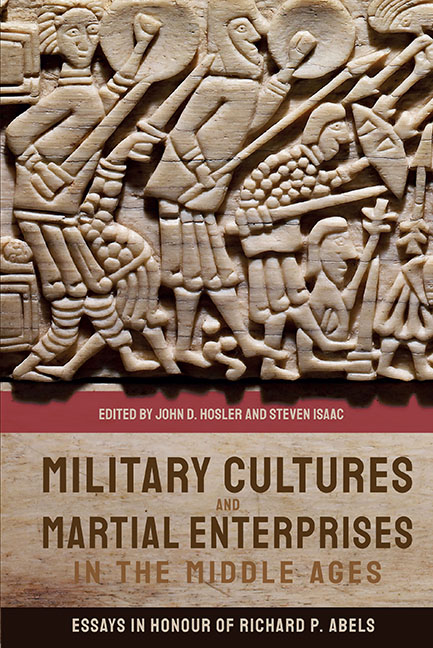Book contents
- Frontmatter
- Contents
- List of Illustrations
- Notes on Contributors
- Introduction and Appreciation
- 1 Charlemagne’s Invasion of Spain in 778: The Anatomy of a Strategic Failure and its Impact
- 2 Military Intelligence and Strategic Planning Under the Ottonian Kings of Germany, 919–1024
- 3 Ain’t Nobody Here But Us Chickens: Defeated Warriors, Masculinity, and Mistaken Identity in Western Europe, 679–1141
- 4 Count Baldwin V of Flanders: Broker of Eleventh-Century Power
- 5 Kings and Fortuna: The Meanings of Brémule
- 6 Fighting the Last War: Remembering the Norman Conquest during the Anarchy
- 7 Gilbert of Mons’ Chronicle of Hainaut as a Source for Military History in the Twelfth Century
- 8 At Home with Roger of Howden
- 9 Embedded Reporters? Ambroise, Richard de Templo, and Roger of Howden on the Third Crusade
- 10 The Treatment of Male and Female Prisoners of War during the Third Crusade
- 11 Exempla, Crusade, and Chivalry
- 12 Frontier Warfare in the St Omer Chronicle
- 13 Some Observations on the Training of Medieval Warhorses
- Richard P. Abels’ Curriculum Vitae
- Index
- Tabula Gratulatoria
9 - Embedded Reporters? Ambroise, Richard de Templo, and Roger of Howden on the Third Crusade
Published online by Cambridge University Press: 21 October 2020
- Frontmatter
- Contents
- List of Illustrations
- Notes on Contributors
- Introduction and Appreciation
- 1 Charlemagne’s Invasion of Spain in 778: The Anatomy of a Strategic Failure and its Impact
- 2 Military Intelligence and Strategic Planning Under the Ottonian Kings of Germany, 919–1024
- 3 Ain’t Nobody Here But Us Chickens: Defeated Warriors, Masculinity, and Mistaken Identity in Western Europe, 679–1141
- 4 Count Baldwin V of Flanders: Broker of Eleventh-Century Power
- 5 Kings and Fortuna: The Meanings of Brémule
- 6 Fighting the Last War: Remembering the Norman Conquest during the Anarchy
- 7 Gilbert of Mons’ Chronicle of Hainaut as a Source for Military History in the Twelfth Century
- 8 At Home with Roger of Howden
- 9 Embedded Reporters? Ambroise, Richard de Templo, and Roger of Howden on the Third Crusade
- 10 The Treatment of Male and Female Prisoners of War during the Third Crusade
- 11 Exempla, Crusade, and Chivalry
- 12 Frontier Warfare in the St Omer Chronicle
- 13 Some Observations on the Training of Medieval Warhorses
- Richard P. Abels’ Curriculum Vitae
- Index
- Tabula Gratulatoria
Summary
THE RELATIONSHIPS BETWEEN medieval writers, whether interpersonal or intertextual, can reveal fascinating aspects of their respective works. This includes not only the transmission of information over time and through the manuscript tradition but also in terms of the geographical and intellectual reception of their ideas. Medieval writers encountered each other in a number of ways. Some went to school together, others attended public lectures, still more met through chance encounters during court visits and official and personal travels to ecclesiastical centers, or perhaps even on pilgrimages. After making such an acquaintance, a writer might later seek out his work, either in person or through post; an example is John of Salisbury, who once sent Peter of Celle a preliminary draft of his treatise Policraticus and received from the same the letters of Bernard of Clairvaux.
Others met during war time. This chapter is about three writers who participated in the Third Crusade and were all witness sources to the end stages of its first and grandest encounter, the siege of Acre, 1189–91. That all three were at the siege has long been known, and that information was shared between their respective accounts equally so. What has not been studied, however, are the potential interpersonal relationships between them. Since they all traveled east with King Richard the Lionheart's English contingent, there is every possibility that they actually met each other while on campaign. Going further, these three sources for the crusade resemble not the ubiquitous depiction of medieval military historiography – ignorant, cloistered monks composing in obscurity – but rather embedded reporters of more recent times. Proceeding somewhat tongue-in-cheek with this journalism simile, I argue that tracing the physical locations of Ambroise, Richard de Templo, and Roger of Howden during the Third Crusade raises important questions about how information on medieval warfare was recorded and transmitted and that their embedded status enhances the credibility of their accounts of military operations at Acre.
On Assignment
Richard the Lionheart's contingent began its trek towards the East in the summer of 1189, and we can track the locations of all three authors therein, to varying degrees. As will be shown, the most critical piece is that all of them eventually linked up with the king before he sailed from Marseille to Sicily. We know the exact route of the king himself.
- Type
- Chapter
- Information
- Military Cultures and Martial Enterprises in the Middle AgesEssays in Honour of Richard P. Abels, pp. 177 - 191Publisher: Boydell & BrewerPrint publication year: 2020



